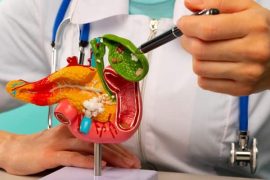Зміст
Acute pain in the throat when swallowing is called odynophagia. The disease can occur alone or together with other symptoms and indicate an ongoing disease in the body. In most cases, upper respiratory tract infections cause a sore throat when swallowing. Find out what else can cause odynophagia and how to effectively combat it.
What is odynophagia?
Odynophagia is a medical term used to describe the disease symptom of painful swallowing. Most often, this is a symptom that accompanies the development of various inflammatory conditions that can primarily affect the mouth, throat, trachea and larynx, as well as the salivary glands, gums, esophagus, and even the stomach. Pain typically occurs because food irritates the lining of the throat, mouth, or esophagus.
A sore throat when swallowing saliva can be a consequence of many diseases occurring in different parts of the body. For this reason, odynophagia is divided into two types: esophageal and extra-esophageal.
Possible causes of sore throat when swallowing
Acute sore throat that occurs when swallowing is not a disease itself, but only a symptom. It can appear with diseases such as:
- inflammation of the oral cavity,
- inflammation of the throat or esophagus,
- purulent sore throat,
- throat infections of viral, bacterial or fungal origin,
- inflammation and ulceration of the esophagus,
- diseases of the larynx and trachea,
- diseases of the salivary glands,
- stomach diseases,
- tonsillitis,
- abscess (peritonsillar, tongue, epiglottis),
- drying of the mucous membranes of the mouth and throat,
- gastroesophageal reflux disease,
- diseases of the central nervous system,
- inflammatory bowel diseases (Crohn’s disease),
- throat cancer,
- esophageal carcinoma
- cancer of the hypopharynx,
- laryngeal cancer,
- allergies,
- Hypothyroidism,
- crooked septum.
Swallowing problems can also occur when a foreign body becomes lodged in the throat or esophagus. External factors such as:
- smoking,
- alcohol abuse,
- contaminated air.
Symptoms of odynophagia (pain when swallowing)
Sore throat when swallowing can have different symptoms. For some people it occurs only while eating, while for others it even happens while drinking or swallowing saliva. Moreover, the disease can manifest itself not only in the throat, but also in the esophagus, chest, or sternum. Very often, in addition to pain when swallowing, patients note accompanying symptoms, such as a sore throat and difficulty breathing.
How is a sore throat when swallowing diagnosed?
Due to the complexity of the issue of sore throat when swallowing, every detail is important, including the nature of the disease and accompanying symptoms. During the visit, the doctor conducts a thorough interview with the patient and asks, among other things: about the location of pain, the occurrence of diseases, and even about the consistency of liquids and foods that are difficult to swallow.
Sometimes the cause of pain when swallowing can be seen with the naked eye. If this is not the case, tests such as throat swab culture, endoscopic swallow test, videofluoroscopy, manometry or pH testing are performed to illustrate the functioning of the esophagus. If a foreign body is suspected in the respiratory tract, X-ray examination may be helpful.
Treatment for sore throat when swallowing
The form of treatment depends primarily on the cause of the sore throat when swallowing. If it was caused by a bacterial infection, treatment with antibiotics will be required. In other cases, symptomatic treatment is usually used.
It is worth purchasing over-the-counter medications available from pharmacies, such as lozenges, numbing throat sprays or gargles. You can ask your pharmacist for help choosing a medicine. At the same time, you can use home remedies for sore throat, such as drinking warm teas and herbal infusions such as sage, chamomile. You should also remember to keep your throat lining well and frequently moisturized.
When should you see a doctor if you have pain when swallowing?
Seeing a doctor is recommended when a sore throat when swallowing is so persistent that it interferes with normal functioning and eating. If the pain does not improve despite treatment, you should also seek medical help.








